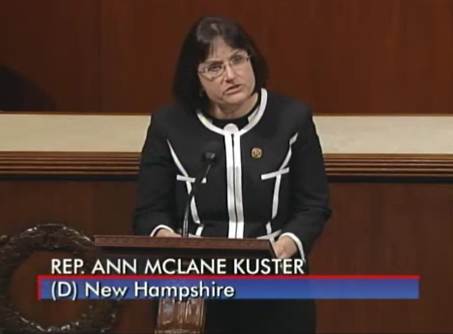Press Releases
Kuster Calls for Balanced, Bipartisan Plan to Avert Automatic Spending CutsHighlights new report showing middle class New Hampshire families will pay the price without it
Washington, DC,
February 26, 2013
Congresswoman Annie Kuster (NH-02) spoke on the House floor about the need for Republicans and Democrats to work together on a balanced, bipartisan plan to avert the automatic spending cuts that are scheduled to take effect on March 1. If Congress fails to act, these devastating cuts will hurt middle class families, undermine our economy, and threaten our national security.
Congresswoman Annie Kuster (NH-02) spoke on the House floor last night about the need for Republicans and Democrats to work together on a balanced, bipartisan plan to avert the automatic spending cuts that are scheduled to take effect on March 1. If Congress fails to act, these devastating cuts will hurt middle class families, undermine our economy, and threaten our national security. “If Congress fails to act, the sequester is going to trigger mindless, across-the-board cuts that will hurt middle class New Hampshire families and undermine our economy,” Kuster said. “There’s no question we need to reduce the deficit. But we have to do it in a balanced way that distinguishes between wasteful spending we can’t afford to keep and critical investments we can’t afford to cut.” The nonpartisan Congressional Budget Office (CBO) estimates that these automatic spending cuts would reduce economic growth by half in 2013 and cost up to 1.4 million jobs nationwide. A recent study by George Mason University estimated that New Hampshire would lose more than 6,300 jobs. On Sunday, the White House issued a new report outlining the devastating impacts these automatic cuts would have on middle class New Hampshire families over the next year alone:
Kuster has repeatedly called on Congress to replace these automatic cuts with a balanced plan to reduce the deficit. Last week, Kuster called on both parties to work together to avert the sequester during a visit to Polartec, which produces uniform and combat clothing for the Department of Defense and would be negatively impacted by the defense cuts included in the sequester. Kuster recently wrote an op-ed highlighting the damaging impacts the automatic cuts would have on families and businesses in New Hampshire, and urged Congress to take a more balanced, bipartisan approach to reducing the deficit that will spur job creation, grow the economy, and protect middle class families. In February, Kuster also helped establish the United Solutions Caucus, a new bipartisan coalition of Republican and Democratic freshman focused on resolving our nation’s fiscal challenges in a common sense, bipartisan way. ### Press Contact: |

